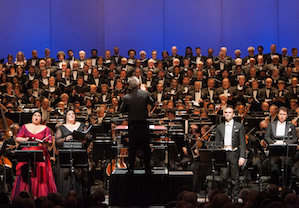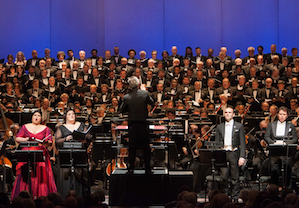
Photo by Drew Altizer
We all knew it would be special. How could it have been anything but when the performance combined, on the extended stage of the War Memorial Opera House, the orchestras and choruses of San Francisco Opera and Italy’s Teatro di San Carlo di Napoli, both under the baton of their shared music director, the gifted Nicola Luisotti? With the addition of four world-league soloists and the nature of the occasion itself — the worldwide celebration of the "Verdi Bicentennial in 2013 The Year of Italian Culture in the United States" — we had a powerhouse performance with the potential to earn a place in the history books.
What no one knew, however, was how emotionally deep the performance would go. Transcending the tendency to blow the roof off in Verdi's most operatic of requiems, Luisotti, his orchestras and choruses, and two of his soloists, soprano Leah Crocetto and tenor Michael Fabiano, went, not just for power, but also for spiritual truth. The result was a Verdi Requiem as moving for its inward affirmations of faith as for its outward exclamations of wrath and pain.
After a slightly bumbled welcome by San Francisco Mayor Ed Lee, who reminded us that the city is named after St. Francis, and a strong and concise one from Naples Mayor Luigi de Magistris, the performance got underway. Immediately, the change from Verdi’s day was apparent as the orchestras’ respective concertmasters, both women, entered to tune the combined forces.
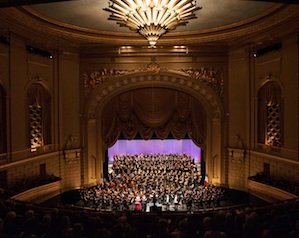
Photo by Drew Altizer
On a built-out stage that covered the pit, with choruses arrayed on risers at stage rear before and beneath acoustic panels, the orchestras began with wondrously soft, still tones that, thanks to Luisotti’s accents, at times seemed to weep. With the solidity of the choruses soon established, the ensuing quartet and chorus, “Kyrie eleison,” revealed the strengths and imbalances of the soloists.
To proceed from right to left, per my seat on orchestra right, bass Vitalij Kowaljow displayed a somewhat muffled voice that seemed bottled up inside him throughout the evening. While no doubt well suited for the grave elders, kings, warriors, and religious leaders he often portrays on the operatic stage, his voice seemed to forever proclaim the same emotion. When, in his “Confutatis, maledictis” (When the damned are silenced) solo with chorus, he sang that he was praying suppliant and kneeling, the words spoke contrition but his loud tone communicated unyielding strength and defiance.
Tenor Michael Fabiano, on the other hand, was a marvel. Distinguished by virile, lyric tone that projected beautifully through the house, Fabiano’s sound was so beautiful, and the transition from the bottom to the top of his range so seamless, as to proclaim him “the” tenor that we have all been waiting for. Of equal importance, at the core of his gorgeous sound and flawless performance lay a sincerity and piety that motivated his voice from wondrously hushed, soft tones of prayer to penetrating proclamations. By revealing his strength and vulnerability with heart-touching honesty, Fabiano established himself as both a gifted singer and a supreme artist. Bravo!
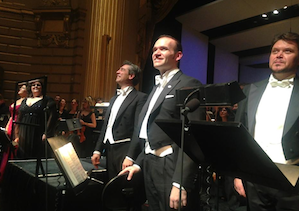
Photo by Marina Nelson
Mezzo-soprano Margaret Mezzacappa, from whom we heard briefly in last season’s The Tales of Hoffmann, has a large, rich voice with a penetrating edge throughout the range. That edge, of course, aids in projection and impact. But when it failed to soften, even when she did her best to float her tones in a volume that rarely descended below mezzoforte, it made for a sameness of emotion that vitiated spiritual impact.
It also presented a major challenge to our beloved soprano, Leah Crocetto. Undaunted by the unintentional competition next door in the projection department, Crocetto stayed true to her heart. After a start where both her voice and Mezzacappa’s seemed overly laden with vibrato, she proceeded to sing every note and word as though central to her spiritual being. When the words spoke of vulnerability, Crocetto softened as would Desdemona in Otello; when she asked God to intervene, her pleas seemed, not just loud, but real.
Such was the pattern throughout an evening whose drama was augmented by a change of backdrop lighting. From white, we proceeded to a too obvious, textbook red in the Dies Irae, albeit one accompanied by antiphonal trumpets so exciting as to thankfully divert the mind from non-musical distractions. The backdrop changed to a bluish purple at the end of the Offertorio quartet, once to orange, sometimes to baby blue, and, thankfully, back to white.
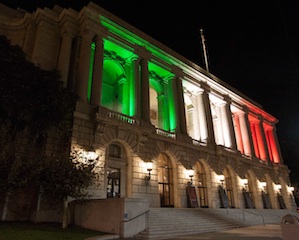
Photo by Drew Altizer
There were numerous musical highlights. These included the profound manner in which the chorus answered bass Kowaljow early on; Crocetto’s many angelic solo utterances; a marvelous duet between Crocetto and Mezzacappa where the latter, for once, modulated her volume; the gorgeous violins, whose softness at the end of the Agnus Dei further conveyed the heart of the Mass; the Lux aeterna trio of mezzo-soprano, tenor, and bass where Fabiano’s emotion seemed so genuine that all else mattered not; and then, the final Libera Me for soprano and chorus.
It was in that extended conclusion, above all, that Luisotti’s soul and Crocetto’s gifts shone strongest. Free to sing without impediment, Crocetto delivered a dramatic and emotional tour de force. After her voice literally trembled when she asked for deliverance on judgment day, the chorus moved from a virtual whisper on “quando coeli …” (when the heavens and the earth shall be moved) to the heightened dramatic power of the ensuing lines. Where some sopranos succumb to stridency, Crocetto remained angelic and pure in her strongest passages. Her floated high B-flat on the word “requiem” was almost perfect, and her forte high C gorgeous.
The same must be said of Luisotti’s intent. He clearly understood the depth of Verdi’s love and respect for the poet Alessandro Manzoni, and conducted his gifted orchestras and choruses (with the assistance of their chorus masters Ian Robertson and Salvatore Caputo) with love leading the way. If only two of his soloists could fully join orchestra and chorus in realizing his intent, they did so with a brilliance that affirmed all that is sacred in art and life.

